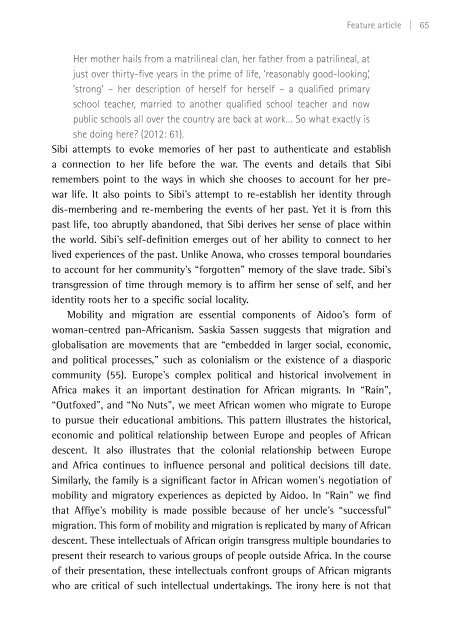You also want an ePaper? Increase the reach of your titles
YUMPU automatically turns print PDFs into web optimized ePapers that Google loves.
Feature article | 65<br />
Her mother hails from a matrilineal clan, her father from a patrilineal, at<br />
just over thirty-five years in the prime of life, ‘reasonably good-looking,’<br />
‘strong’ – her description of herself for herself – a qualified primary<br />
school teacher, married to another qualified school teacher <strong>and</strong> now<br />
public schools all over the country are back at work… So what exactly is<br />
she doing here? (2012: 61).<br />
Sibi attempts to evoke memories of her past to authenticate <strong>and</strong> establish<br />
a connection to her life before the war. The events <strong>and</strong> details that Sibi<br />
remembers point to the ways in which she chooses to account for her prewar<br />
life. It also points to Sibi’s attempt to re-establish her identity through<br />
dis-membering <strong>and</strong> re-membering the events of her past. Yet it is from this<br />
past life, too abruptly ab<strong>and</strong>oned, that Sibi derives her sense of place within<br />
the world. Sibi’s self-definition emerges out of her ability to connect to her<br />
lived experiences of the past. Unlike Anowa, who crosses temporal boundaries<br />
to account for her community’s “forgotten” memory of the slave trade. Sibi’s<br />
transgression of time through memory is to affirm her sense of self, <strong>and</strong> her<br />
identity roots her to a specific social locality.<br />
Mobility <strong>and</strong> migration are essential components of Aidoo’s form of<br />
woman-centred pan-<strong>Africanism</strong>. Saskia Sassen suggests that migration <strong>and</strong><br />
globalisation are movements that are “embedded in larger social, economic,<br />
<strong>and</strong> political processes,” such as colonialism or the existence of a diasporic<br />
community (55). Europe’s complex political <strong>and</strong> historical involvement in<br />
Africa makes it an important destination for African migrants. In “Rain”,<br />
“Outfoxed”, <strong>and</strong> “No Nuts”, we meet African women who migrate to Europe<br />
to pursue their educational ambitions. This pattern illustrates the historical,<br />
economic <strong>and</strong> political relationship between Europe <strong>and</strong> peoples of African<br />
descent. It also illustrates that the colonial relationship between Europe<br />
<strong>and</strong> Africa continues to influence personal <strong>and</strong> political decisions till date.<br />
Similarly, the family is a significant factor in African women’s negotiation of<br />
mobility <strong>and</strong> migratory experiences as depicted by Aidoo. In “Rain” we find<br />
that Affiye’s mobility is made possible because of her uncle’s “successful”<br />
migration. This form of mobility <strong>and</strong> migration is replicated by many of African<br />
descent. These intellectuals of African origin transgress multiple boundaries to<br />
present their research to various groups of people outside Africa. In the course<br />
of their presentation, these intellectuals confront groups of African migrants<br />
who are critical of such intellectual undertakings. The irony here is not that


